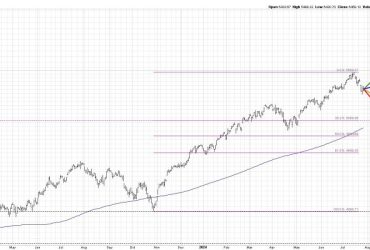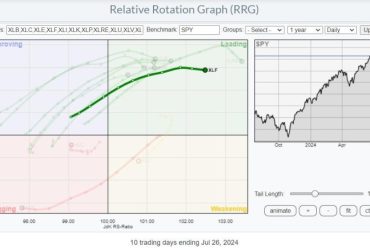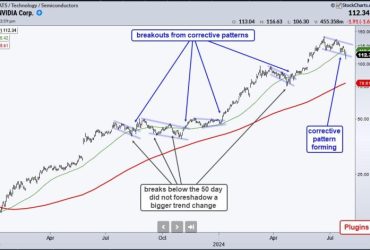The selling in this market is accelerating, and some of it is in areas of the market which usually hold up during stressful periods. One of them is healthcare, where a changing financial picture and the effects of AI are creating a new landscape for investors to ponder. Of course, this could lead to a contrarian buying opportunity.
Preparation Leads to Success
Last week in this space, I noted the stock market had shifted to a new and “cautionary” gear, based on the deterioration of the market’s breadth, the dearth of up trending sectors, and the stealthy rise in the CBOE Volatility Index (VIX) above a longstanding resistance level at 20.
Unfortunately, instead of a hoped-for reversal, the sellers stepped on the gas pedal. All three members of the bearish triad got worse as VIX rose above 20, the New York Advance Decline line (NYAD) broke below the March 2023 lows, and the number of sectors in uptrends remained near the recent lows.
On the other hand, the stock market is increasingly oversold, so investors should prepare for a potential bounce before the end of the year, especially given the usual bullish seasonality which begins in November and can run through January.
Here’s what we’re doing at Joe Duarte in the Money Options.com:
Raising cash as positions get stopped out;Hedging portfolios via options and inverse ETFs;Keeping position size in long holdings small;Looking for relative strength in offbeat areas of the market; andBuilding a shopping list for when conditions improve.
Contrarian Alert: Healthcare Crashes and Burns as AI Reshapes the Playing Field
There are always unintended consequences when complex systems adjust. And the Federal Reserve’s aggressive rate hikes and talk of holding rates “higher for longer” is spreading throughout the stock market. Usually, the healthcare sector fares better than other areas during challenging periods, as it’s traditionally considered “recession-proof.”
Unfortunately, this time is different.
Aside from the negative effect of higher interest rates, the healthcare sector is facing significant secular headwinds through the combined effects of an aging population and changing budget priorities in Medicare and private insurers. Medicare is projected to run out of money just as the elderly population surges, while insurance companies are increasing their use of AI for data management and the creation of treatment plan algorithms for patient care. This use of AI is already impacting the bottom line for both insurers and providers.
Insurers are reaping the benefits of the cost cuts and efficiencies which have resulted from the use of AI. Hospitals and drug companies have been hit with, increasing numbers of small and rural hospitals closing their doors. Medical groups who bought private doctor practices are also struggling as their bills get trimmed by AI protocols and contracts.
Investors are facing the potential for a reduction in income for care providers. Check out the action in the Healthcare Select Sector SPDR Fund (XLV), where short sellers (falling ADI) are jumping for joy, while buyers are just plain jumping off the train (crashing OBV).
Aside from the fate of hospitals and medical practices (corporate and private), another concern is the future of drug prices. This may account for the sudden decline in the shares of anti-obesity drug giant Novo Nordisk (NVO), which have broken below their 50-day moving average and look set to test the $90 area. What makes the selling worse is that Novo continues to gain favorable press given the success of its Wegovy drug on weight loss and blood sugar control and its potential for being used in other conditions. In this case, OBV is drooping while ADI is holding up, which suggests that the selling is more due to investors bailing out than because of short sellers piling on.
Elsewhere, shares of the largest U.S. hospital operator HCA Inc. (HCA) are in freefall, despite a profitable quarter, in which it nevertheless missed analyst expectations due to problems with its physician staffing joint venture Valesco. At the heart of the matter is an emergency room staffing group known as Emcare, which according to reports is encountering difficulties in receiving reimbursements from insurance companies and managing its costs as it struggles to find physicians willing to work in the current market.
According to HCA management, in comments during its earnings call, Emcare lost $100 million in the most recent quarter. HCA expects Emcare to lose $50 million per quarter going forward; even as HCA tries to renegotiate contracts with insurers. Emcare was an affiliate of Envision Healthcare, which filed for bankruptcy in May 2023 due to financial issues. HCA recently increased its stake in the company from 50 to 90%.
The bright light in the sector is shining on insurance. An example is United Healthcare (UNH) whose shares are near their recent highs. UNH delivered a sterling earnings report for Q3, featuring 14% year-over-year revenue and earnings growth.
A big part of UNH’s success comes from its Optum division’s focus on AI-derived data management and its use in designing algorithms, to which health care providers contracted to the company must adhere to remain under contracts with the insurer.
I’ll be keeping a close eye on the healthcare sector, as the pessimism level is reaching a fever pitch; the potential for picking up blue chip bargains seems to be rising as the selling also reaches a fever pitch.
Join the smart money at Joe Duarte in the Money Options.com. You can have a look at my latest recommendations FREE with a two-week trial subscription. And for frequent updates on real estate and housing, click here.
Incidentally, if you’re looking for the perfect price chart set up, check out my latest YD5 video, where I detail one of my favorite bullish setups. This video will prepare you for the next phase in the market.
Market Breadth Breaks Below March Lows; VIX Breaks Above 20
The NYSE Advance Decline line (NYAD) broke below its March and May 2023 bottoms last week. A sustained break below both these levels, as highlighted by the trend line, would be extremely bearish. Meanwhile, the RSI for NYAD is now well below 30, an oversold reading, which could lead to a reversal of the current bearish posture for the market.
The Nasdaq 100 Index (NDX) remained below its 50-day moving average, but did not make a new low. That’s a hopeful sign unless it’s reversed. ADI moved lower as short sellers increased their bearish bets, and OBV also turned lower as selling pressure builds. NDX remains oversold.
The S&P 500 (SPX) extended its break below its 200-day moving average while breaching the important support level at 4150. ADI and OBV turned lower again, signaling rising selling pressure. RSI is well below 30, signaling an oversold condition.
VIX Crosses Above 20, Signaling Rising Fear
The CBOE Volatility Index (VIX) has finally crossed above the important 20 level, which up to now had kept the bears in check. If this is not reversed, it will likely cause more trouble in the next few days to weeks.
When the VIX rises, stocks tend to fall, as rising put volume is a sign that market makers are selling stock index futures to hedge their put sales to the public. A fall in VIX is bullish, as it means less put option buying, and it eventually leads to call buying, which causes market makers to hedge by buying stock index futures. This raises the odds of higher stock prices.
To get the latest information on options trading, check out Options Trading for Dummies, now in its 4th Edition—Get Your Copy Now! Now also available in Audible audiobook format!
#1 New Release on Options Trading!
Good news! I’ve made my NYAD-Complexity – Chaos chart (featured on my YD5 videos) and a few other favorites public. You can find them here.
Joe Duarte
In The Money Options
Joe Duarte is a former money manager, an active trader, and a widely recognized independent stock market analyst since 1987. He is author of eight investment books, including the best-selling Trading Options for Dummies, rated a TOP Options Book for 2018 by Benzinga.com and now in its third edition, plus The Everything Investing in Your 20s and 30s Book and six other trading books.
The Everything Investing in Your 20s and 30s Book is available at Amazon and Barnes and Noble. It has also been recommended as a Washington Post Color of Money Book of the Month.
To receive Joe’s exclusive stock, option and ETF recommendations, in your mailbox every week visit https://joeduarteinthemoneyoptions.com/secure/order_email.asp.








